In the ever-evolving landscape of digital marketing, email remains a cornerstone of customer engagement. Two giants in this arena, Adobe Campaign and Salesforce Marketing Cloud, offer robust solutions for businesses seeking to elevate their email marketing strategies. As companies strive to create more personalized, efficient, and effective campaigns, understanding the nuances between these platforms becomes crucial. This comprehensive comparison delves into the strengths, weaknesses, and unique features of Adobe Campaign and Salesforce Marketing Cloud. Additionally, we’ll explore innovative strategies and introduce Prism Reach, an AI-powered solution designed to enhance your email marketing efforts.
Key Facts
- Adobe Campaign: Excels in multi-channel campaign management and seamless integration with other Adobe products.
- Salesforce Marketing Cloud: Offers superior CRM integration and advanced journey-building capabilities.
- Both platforms provide robust automation, personalization, and analytics features, but with distinct strengths and learning curves.
- Prism Reach leverages AI to offer deep personalization, complementing the capabilities of both Adobe Campaign and Salesforce Marketing Cloud.
- Choosing the right platform depends on specific business needs, existing technology ecosystems, and marketing goals.
Battle of the Titans: Adobe Campaign vs Salesforce Marketing Cloud
When it comes to email marketing powerhouses, Adobe Campaign and Salesforce Marketing Cloud stand out as industry leaders. Both platforms offer comprehensive solutions, but they cater to different strengths and organizational needs. Let’s dive deeper into their key features and capabilities.
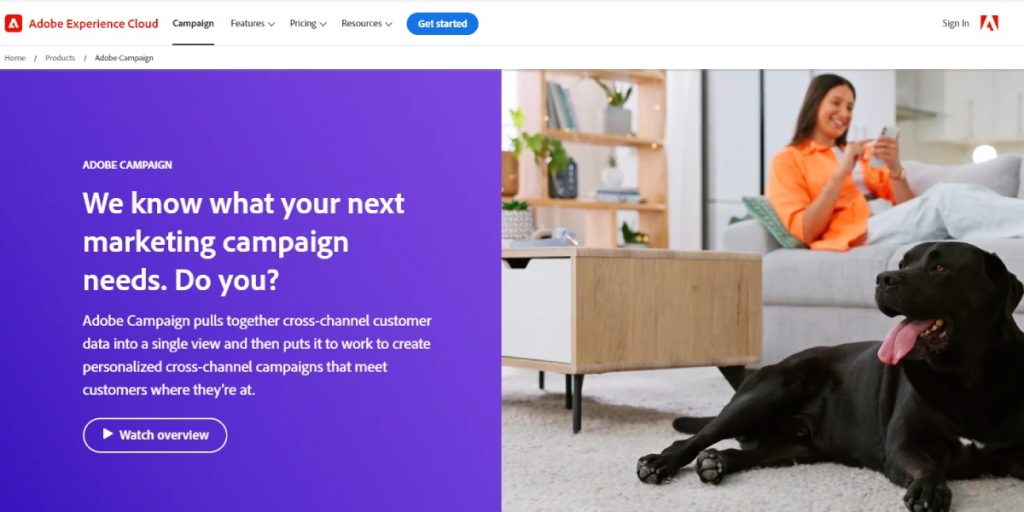
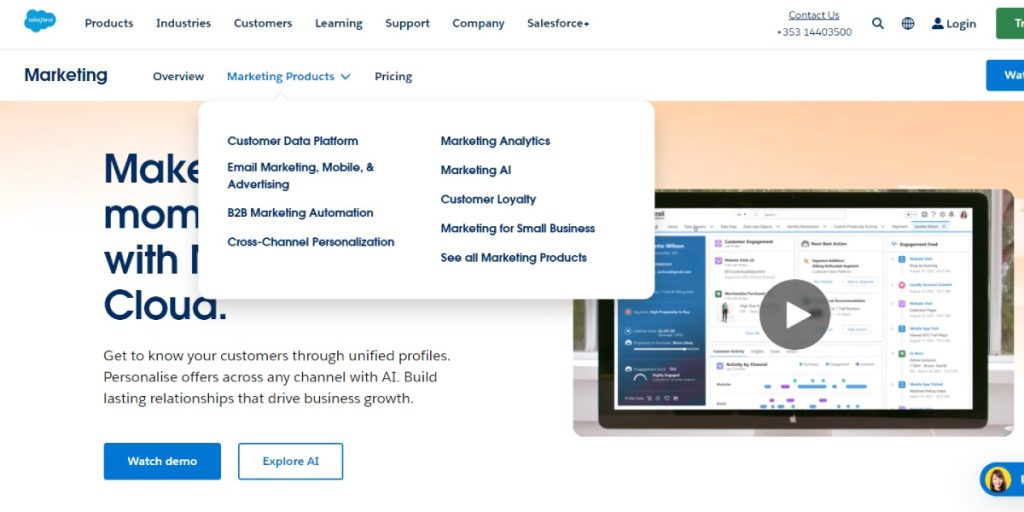
Multi-Channel Campaign Management
Adobe Campaign shines in its multi-channel campaign management capabilities. As noted by a TrustRadius reviewer, “Adobe Campaign excels in managing campaigns across multiple channels including email, SMS, social media, and web, providing a centralized platform for comprehensive campaign management.” This integration allows marketers to create cohesive experiences across various touchpoints, ensuring a consistent brand message regardless of the channel.
Customer Journey Automation
On the other hand, Salesforce Marketing Cloud’s Journey Builder is a standout feature. A Titan review highlights, “Journey Builder allows marketers to create and automate customer journeys across multiple channels.” This tool enables businesses to craft highly personalized customer experiences, guiding prospects through tailored marketing funnels. The visual interface of Journey Builder makes it easier for marketers to map out complex customer journeys and automate touchpoints based on customer behavior and preferences.
Integration Capabilities
When it comes to integration, Adobe Campaign seamlessly connects with other Adobe products, creating a holistic marketing technology stack. This is particularly beneficial for organizations already invested in the Adobe ecosystem, as it allows for smooth data flow and consistent user experience across various marketing tools.
However, Salesforce Marketing Cloud takes the lead in CRM integration, particularly with Salesforce CRM. A TrustRadius user notes, “The seamless integration with Salesforce CRM ensures smooth data flow and enhanced marketing efficiency.” This tight integration is a significant advantage for businesses that rely heavily on Salesforce for their customer relationship management needs.
Automation and Personalization
Both platforms offer robust automation and personalization features. Adobe Campaign provides advanced tools for creating personalized and targeted marketing content, allowing marketers to tailor their messages based on customer data and behavior patterns.
Salesforce Marketing Cloud, on the other hand, utilizes AI to optimize email delivery times and personalize customer experiences. A Software Advice review mentions, “Salesforce Marketing Cloud uses AI to optimize email delivery times and personalize customer experiences.” This AI-driven approach can lead to higher open rates and improved engagement by delivering content when customers are most likely to interact with it.
User Interface and Ease of Use
In terms of user interface and ease of use, opinions vary. Some users find Adobe Campaign’s interface complex initially but powerful once mastered. As one TrustRadius reviewer states, “The interface can be challenging to navigate at first, but it offers powerful functionality once you get the hang of it.” This learning curve can be steeper for new users but may be worth it for those who need advanced customization options.
Salesforce Marketing Cloud is generally considered more user-friendly, though complex setups can still pose challenges. Its intuitive interface and drag-and-drop functionality make it easier for marketers to create and manage campaigns without extensive technical knowledge.
Analytics and Reporting
Analytics and reporting capabilities are strong in both platforms. Adobe Campaign provides detailed real-time analytics and reporting features, enabling marketers to track campaign performance and optimize future campaigns. These insights are crucial for understanding customer behavior and refining marketing strategies over time.
Salesforce Marketing Cloud offers similar capabilities, with the added advantage of Datorama integration for a unified marketing dashboard. This integration allows marketers to combine data from various sources, providing a more comprehensive view of marketing performance across channels.
Pricing Models
When considering email marketing platforms, pricing is a crucial factor for businesses of all sizes. Both Adobe Campaign and Salesforce Marketing Cloud offer different pricing models, but specific pricing details were not provided in the original information.
Adobe Campaign’s pricing structure is typically customized based on the specific needs and scale of each business. The platform is known for its scalability, suggesting that pricing may vary depending on the size of the organization and the extent of features required.
Similarly, Salesforce Marketing Cloud is known for offering tiered pricing models, but without specific information, it’s recommended that businesses contact the sales teams directly to get accurate, up-to-date pricing information tailored to their specific needs. Factors influencing pricing could include the size of your subscriber list, the volume of emails you plan to send, specific features and modules required, the level of customer support needed, and any custom integrations or implementations.
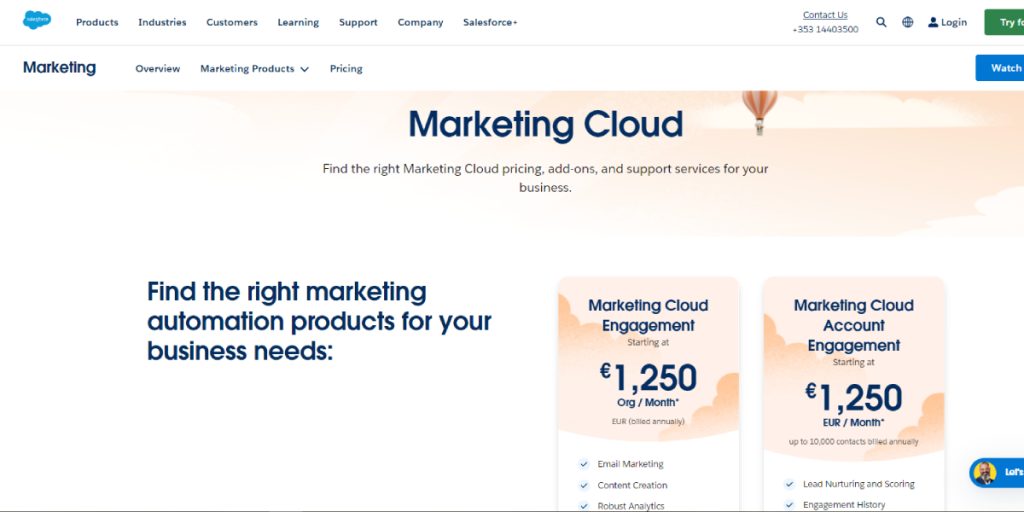
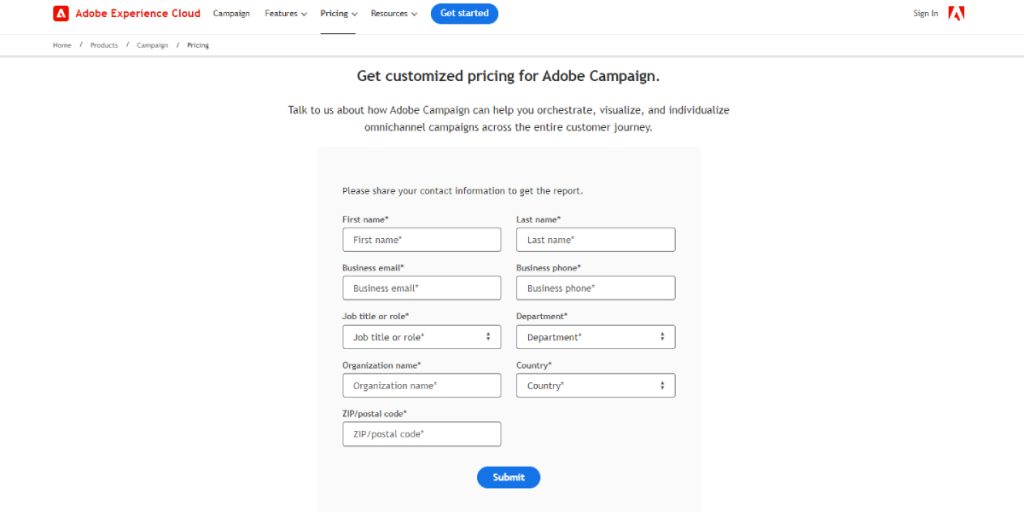
Scalability and Growth Potential
Scalability is a strong point for both platforms. Adobe Campaign is noted for its ability to accommodate growing organizations, making it a suitable choice for businesses expecting significant expansion in their marketing efforts.
Salesforce Marketing Cloud is praised for its scalability across businesses of all sizes. A TrustRadius reviewer comments, “Salesforce Marketing Cloud is scalable to meet the needs of businesses of all sizes, from small businesses to large enterprises.” This flexibility makes it an attractive option for companies at various stages of growth, from startups to multinational corporations.
In conclusion, both Adobe Campaign and Salesforce Marketing Cloud offer powerful features for email marketing and beyond. The choice between them often comes down to specific business needs, existing technology ecosystems, and the level of customization required. Organizations should carefully evaluate their requirements and consider factors such as integration needs, ease of use, and scalability when making their decision.
Hidden Gems: Lesser-Known Strategies for Adobe Campaign and Salesforce Marketing Cloud
While Adobe Campaign and Salesforce Marketing Cloud offer a plethora of features, there are several lesser-known yet highly effective strategies that can significantly enhance your marketing efforts. Here are five hidden gems to leverage within these platforms:
1. Dynamic Content Blocks
- Potential Effectiveness: High
- Obscurity: Moderate
- Ease of Implementation: Easy
- Uniqueness: Unique
Use dynamic content blocks in both platforms to tailor messages based on user behavior or preferences. This can significantly increase engagement rates by ensuring that recipients receive content relevant to their interests.
2. Utilize Journey Mapping Tools
- Potential Effectiveness: High
- Obscurity: Moderate
- Ease of Implementation: Moderate
- Uniqueness: Unique
Both platforms offer journey mapping tools that allow marketers to visualize customer interactions. By mapping out customer journeys, you can identify drop-off points and optimize the experience across channels.
3. Leverage Predictive Analytics
- Potential Effectiveness: Very High
- Obscurity: High
- Ease of Implementation: Moderate to Advanced
- Uniqueness: Unique
Utilize predictive analytics features in Salesforce Marketing Cloud to forecast customer behavior and tailor campaigns accordingly. This can lead to more effective targeting and higher conversion rates.
4. Advanced Segmentation Techniques
- Potential Effectiveness: Very High
- Obscurity: Moderate
- Ease of Implementation: Moderate
- Uniqueness: Unique
Use advanced segmentation techniques, such as behavioral or demographic segmentation, to create highly targeted campaigns that resonate with specific audience segments.
5. Utilize API Integrations for Custom Solutions
- Potential Effectiveness: Very High
- Obscurity: Moderate
- Ease of Implementation: Advanced
- Uniqueness: Unique
Take advantage of API integrations available in both platforms to create custom solutions tailored to your specific business needs, enhancing functionality beyond standard offerings.
Prism Reach: An Innovative Alternative
While Adobe Campaign and Salesforce Marketing Cloud offer robust solutions, innovative platforms like Prism Reach are pushing the boundaries of email marketing personalization. Prism Reach leverages advanced AI algorithms to deliver hyper-personalized content, potentially surpassing the personalization capabilities of traditional platforms.
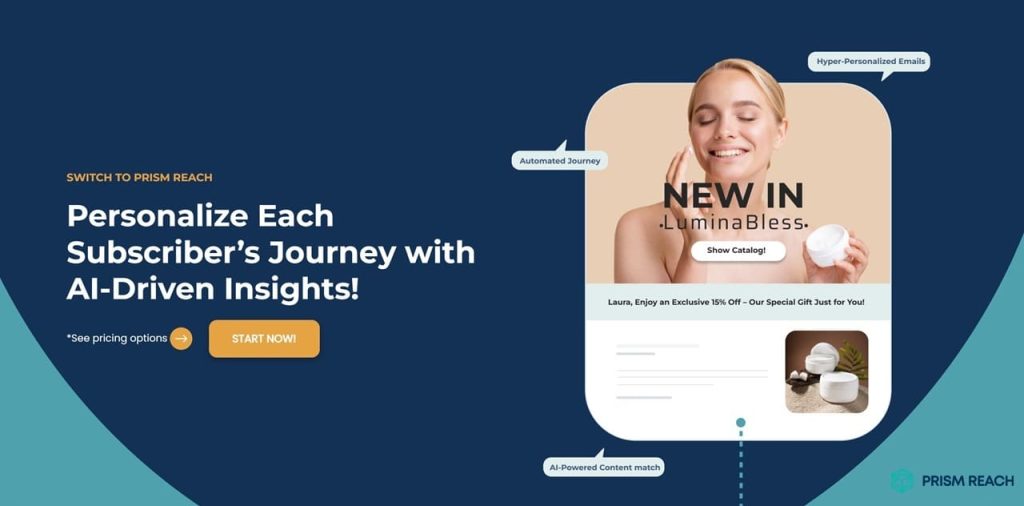
AI-Powered Personalization
Prism Reach leverages sophisticated AI algorithms to personalize newsletter content based on subscriber behavior and preferences. This level of personalization can significantly boost engagement rates, ensuring that your emails resonate with each individual recipient.
Optimal Sending Times
The platform uses predictive analytics to determine the best times to send newsletters, maximizing the likelihood of subscriber engagement. By optimizing send times, Prism Reach helps ensure that your emails are seen and interacted with, even if rendering issues persist.
Advanced AI Features
Prism Reach includes features such as anti-spam checks and high deliverability rates, which are crucial for maintaining engagement levels and avoiding spam filters. These advanced features ensure that your emails reach your audience’s inboxes, enhancing the effectiveness of your campaigns.
Integration and Setup
Prism Reach offers a seamless setup process, allowing for quick integration with existing systems. This ease of integration means that marketers can start leveraging AI-driven personalization without extensive technical expertise, saving time and resources.
Dynamic Content Selection
The AI-driven dynamic content selection feature ensures that each subscriber receives content that is most relevant to them. This targeted approach not only improves engagement but also reduces the impact of any rendering issues by focusing on delivering highly pertinent information.
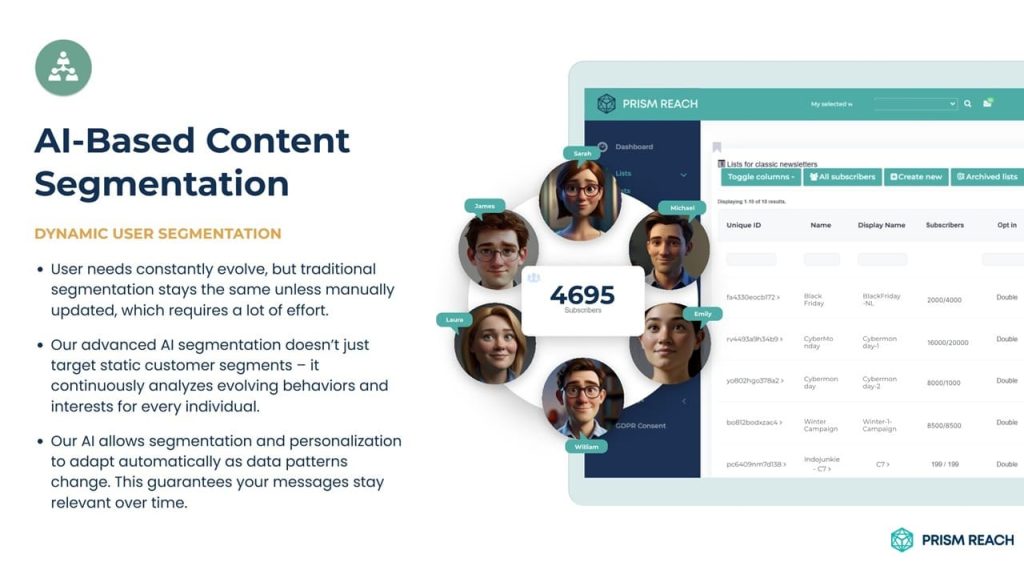
Potential Benefits of Prism Reach
- Increased Engagement: Personalized content tailored to individual subscriber preferences can lead to significantly higher engagement rates.
- Higher Revenue: Tailored advertising and efficient content targeting can enhance monetization rates for published newsletters.
- Improved Productivity: Automation and AI-driven insights reduce the time required to create and manage email campaigns, allowing marketers to focus on strategy and creativity.
User Journey with Prism Reach
The typical user journey with Prism Reach begins with subscribers signing up through customized forms that capture their interests and preferences. As subscribers interact with content, Prism Reach’s AI algorithms continuously refine their profiles, ensuring that each newsletter sent is highly personalized. This journey not only enhances user satisfaction but also boosts the likelihood of long-term subscriber retention.
Compliance and Data Privacy
Prism Reach places a strong emphasis on GDPR compliance, ensuring that all data is handled securely and within regulatory guidelines. By hosting data within Europe and adhering to the highest standards of data protection, Prism Reach builds trust with users and safeguards their information.
Future Prospects
Looking ahead, Prism Reach aims to expand its technology into the eCommerce sector, leveraging its AI capabilities to enhance digital marketing efforts in this rapidly growing area. The company is committed to continuous improvement of its AI algorithms, ensuring that its solutions remain at the forefront of email marketing innovation.
Upgrade Your Email Marketing with AI Personalization!
Conclusion
Adobe Campaign and Salesforce Marketing Cloud offer powerful solutions for email marketing, each with its own strengths. Adobe Campaign excels in multi-channel management and integration with Adobe products, making it ideal for businesses heavily invested in the Adobe ecosystem. Salesforce Marketing Cloud shines in CRM integration and journey-building capabilities, perfect for organizations prioritizing customer relationship management.
The choice between these platforms ultimately depends on specific business needs, existing technology stacks, and marketing goals. For businesses seeking cutting-edge personalization in email marketing specifically, innovative solutions like Prism Reach offer an intriguing alternative, potentially delivering higher engagement rates through AI-driven content customization.
As the email marketing landscape continues to evolve, staying informed about these platforms and emerging technologies will be crucial for businesses aiming to stay ahead in their digital marketing efforts.
Citations
- Adobe Experience League Documentation. (n.d.). Classic Personalization in Adobe Campaign.
- Salesforce Marketing Cloud Resources. (n.d.). Hide View in Browser Text in Adobe Campaign.
- Adobe Experience League Documentation. (n.d.). Enhanced Security in Adobe Campaign.
- Adobe Experience League Documentation. (n.d.). UI Settings in Adobe Campaign.
- Adobe Experience League Documentation. (n.d.). Configuring Campaign Options.